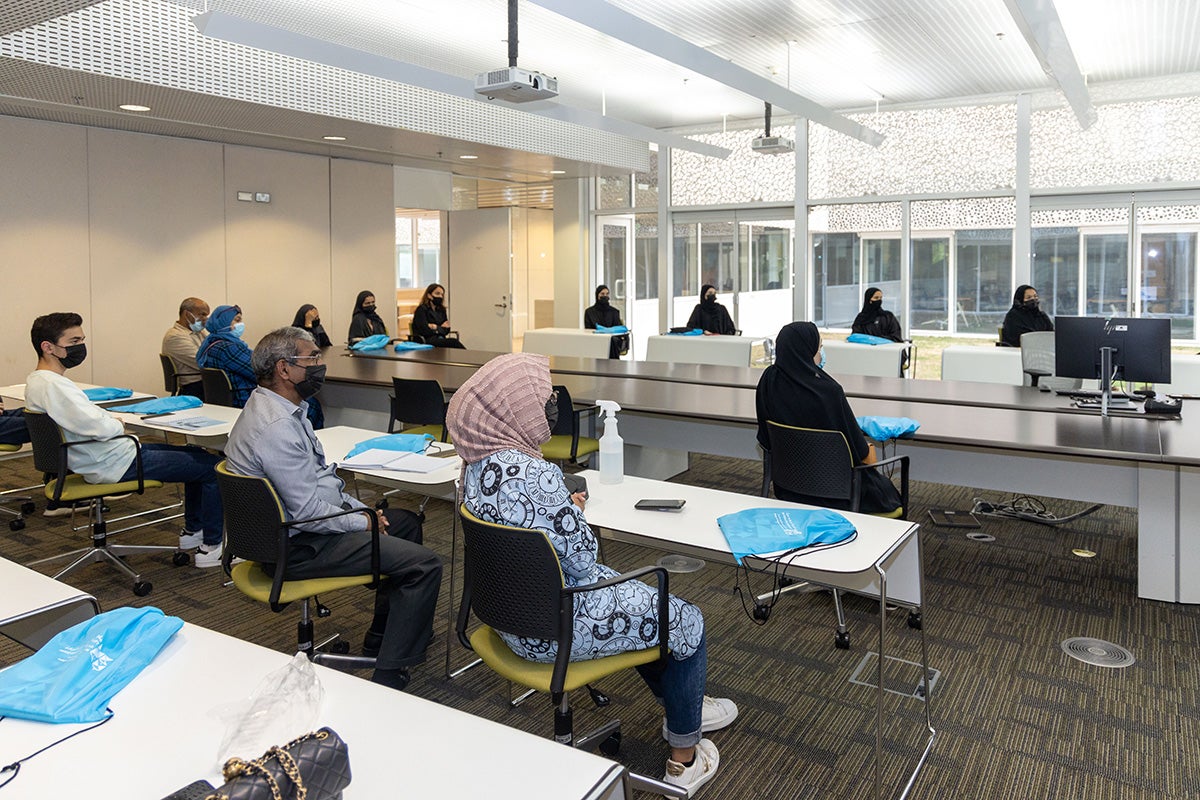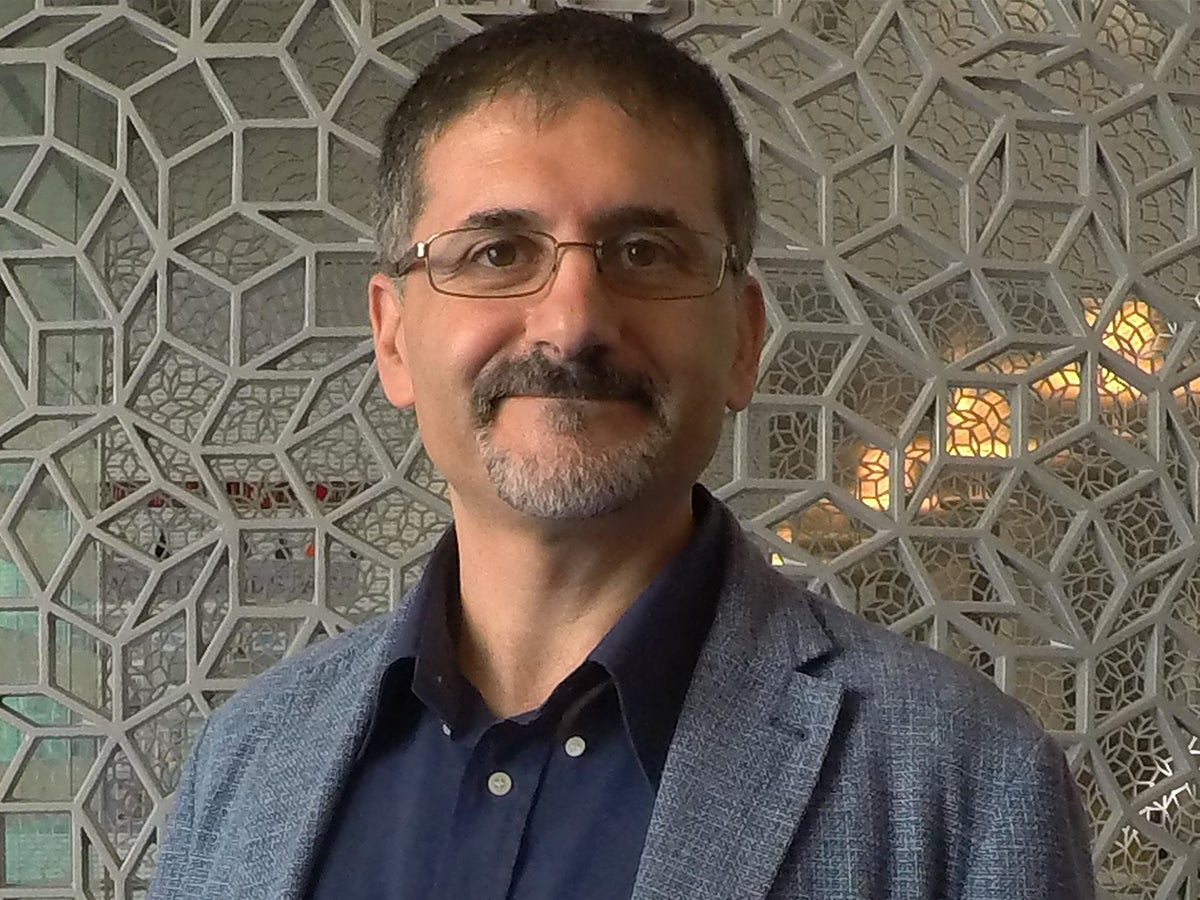
Avenues for the Debate on Digital Mental Health Tools
By Dr. Alaa Abd-Alrazaq, Dr. Arfan Ahmed, Dr. Mowafa Househ

HBKU faculty suggest stigmas and inaccessibility drive the use of mental health applications and technologies
Mental health advocacy has taken center stage in recent years, with a new emphasis that has allowed the deployment of new tools, technologies, and therapeutic interventions. The continuum of the digital wave has meant that these tools were here to address these mental health issues, and COVID-19 has been a case in point.
What is digital mental health?
Digital mental health refers to the use of technologies such as computers, mobiles, wearables, and internet-connected devices to provide mental health services that include assessments, diagnosis, treatment, promotion, and consultation. Digital mental health tools come in many forms, but irrespective of form, all digital mental health tools ensure ease of access to mental health in situations where access would be otherwise scarce.
The need for digital mental health tools
Mental disorders are common around the world. Globally, it has been estimated that 25% of adults and 10% of children are likely to be affected by mental health problems every year. The prevalence of mental disorders among children under 19 year old in North Africa and Middle East is the highest in the world (>12%).
While there is an increase in the demand for mental health services, a shortage of mental health workers runs in parallel. For instance, there are 90 psychiatrists per 100,000,000 people in high-income countries and 0.1 psychiatrists per 1,000,000 people in low-income and middle-income countries. According to the World Health Organization, mental health services are not accessible to nearly 55% and 85% of people in developed and developing countries, respectively. In many regions around the world, mental health is also associated with various stigmas, with the vast majority of sufferers unwilling to speak to professionals. Access to help in a digital format allows anonymity and around-the-clock access to care in the comfort of one's home.
Therefore, digital mental health tools have been utilized to meet the needs of the people who are affected by mental health conditions. Mobile devices have been identified as the mediums of choice in accessing healthcare, largely due to their widespread availability and prevalence. A World Health Organization survey of 15,000 health apps has shown that 29% focus on providing mental health services.
Cultivating the benefits
To cultivate the benefits of digital mental health tools, patients need to understand that these tools are not a substitute for healthcare providers and are complementary to them. Further, healthcare providers, psychologists, and psychiatrists should believe that these tools play a supportive role and will not affect their autonomy or undermine their relationships with their patients. They should therefore encourage themselves and their patients to make use of these digital mental health tools. Healthcare systems also should continue to increase the end-users’ awareness of these tools, their functionalities, and their benefits through targeted publicity across a variety of channels. Moreover, governments should provide more funds to develop these technologies and conduct further research in this area.
To render digital mental health tools effective, they should be powered more by artificial intelligence (AI) to increase their potential. AI-based tools can be used for early detection of mental disorders and providing early intervention such as cognitive behavior therapy. Further, to contribute to a multifunctional ecosystem, these tools should be integrated and connected and not isolated. In addition, technologists should develop highly effective and engaging tools for mental health. They also should build trust in the digital tools by increasing data security and reducing the risk of breaching personal privacy.
Challenges of digital mental health tools
Despite the potentials of digital mental health tools, there are several challenges that need to be considered. Although digital devices such as mobile phones are widely available, the availability of Internet access differs between people based on their age, income, and education. This digital divide can lead to inequality of accessing mental health services through digital tools. Further, many mental health technologies provide non-evidence-based interventions, and such technologies can produce more harm than good. Another challenge is the lack of evidence of the effectiveness of many digital mental health tools. Although the effectiveness of some digital mental health tools was evaluated and tested, it was not an adequate evaluation. As an example, Woebot, a highly touted chatbot for mental health, was subject to technical evaluations for a period of only two weeks. Long-term evaluations of more than six months are normally recommended for digital mental health tools.
The lack of the end-users’ adoption of digital mental health tools is another challenge, which can emanate from a lack of awareness of these tools or concerns about the security of data and potential privacy breaches. In addition, developing AI-based digital mental health tools is challenging because of (1) the need for vast data sets to train and validate models, and (2) the unique, multivariate and multimodal nature of mental disorders, where countless variables in several levels (biological, intrapsychic, interpersonal and sociocultural) are required to build a predictive models.
Research and applications at HBKU
At the College of Science and Engineering at Hamad Bin Khalifa University, we have conducted several studies about chatbots for mental health. For instance, we provided an overview of the features of chatbots for mental health support. Then, we conducted a systematic review and meta-analysis to assess the effectiveness of chatbots in mental health. We also produced a Delphi study to develop a framework for evaluating mental health chatbots. Our research team has been reviewing popular and highly rated chatbot-based applications that focus on self-care for anxiety and depression through the Google Play and Apple Stores.
We are now looking into several studies about other digital mental health tools. For example, we are exploring the accuracy of AI-based technologies in diagnosing and detecting mental disorders. We are also conducting a scoping review about wearable devices that can be used for mental health. Further, we are carrying out a systematic review of the effectiveness of serious games in improving mental health.
We also have developed ESRA, a mobile application that uses artificial intelligence to analyze children's drawings and assess their mental state. Our research team has also developed SUKUN -- an innovative, immersive, mobile application that provides sound therapy in the Arabic language to help users relax, focus and sleep. We are progressing towards the development of MoMeHeD, which is a mobile mental health digital platform to provide mental health services for individuals in Qatar.
Dr. Alaa Abd-Alrazaq and Dr. Arfan Ahmed are post-doctoral fellows of health informatics at the College of Science and Engineering at Hamad Bin Khalifa University. Dr. Mowafa Househ is an associate professor at the college.
Related News

PhD Student at HBKU’s College of Science and Engineering Awarded at Kuwait Invention Competition
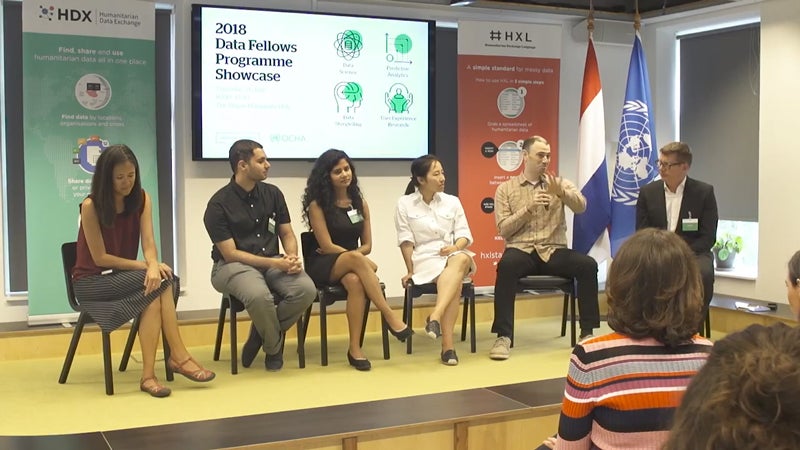
HBKU’s College of Science and Engineering Graduate Advances Education Data as a UN Fellow
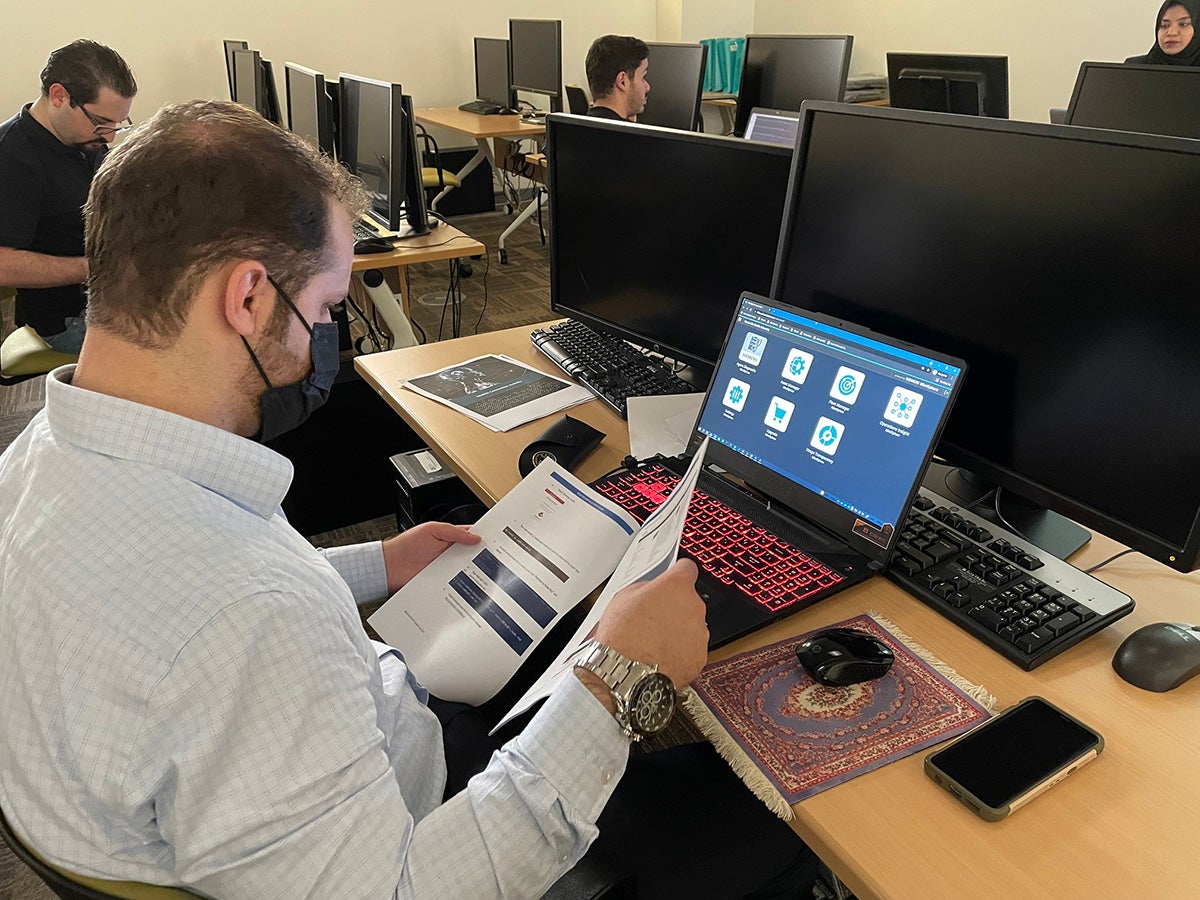
College of Science and Engineering Teams Up With Siemens Qatar to Deliver Digital Skills Training for Students

College of Science and Engineering Faculty Chart a Course for Ethical Software Engineering at International Workshop
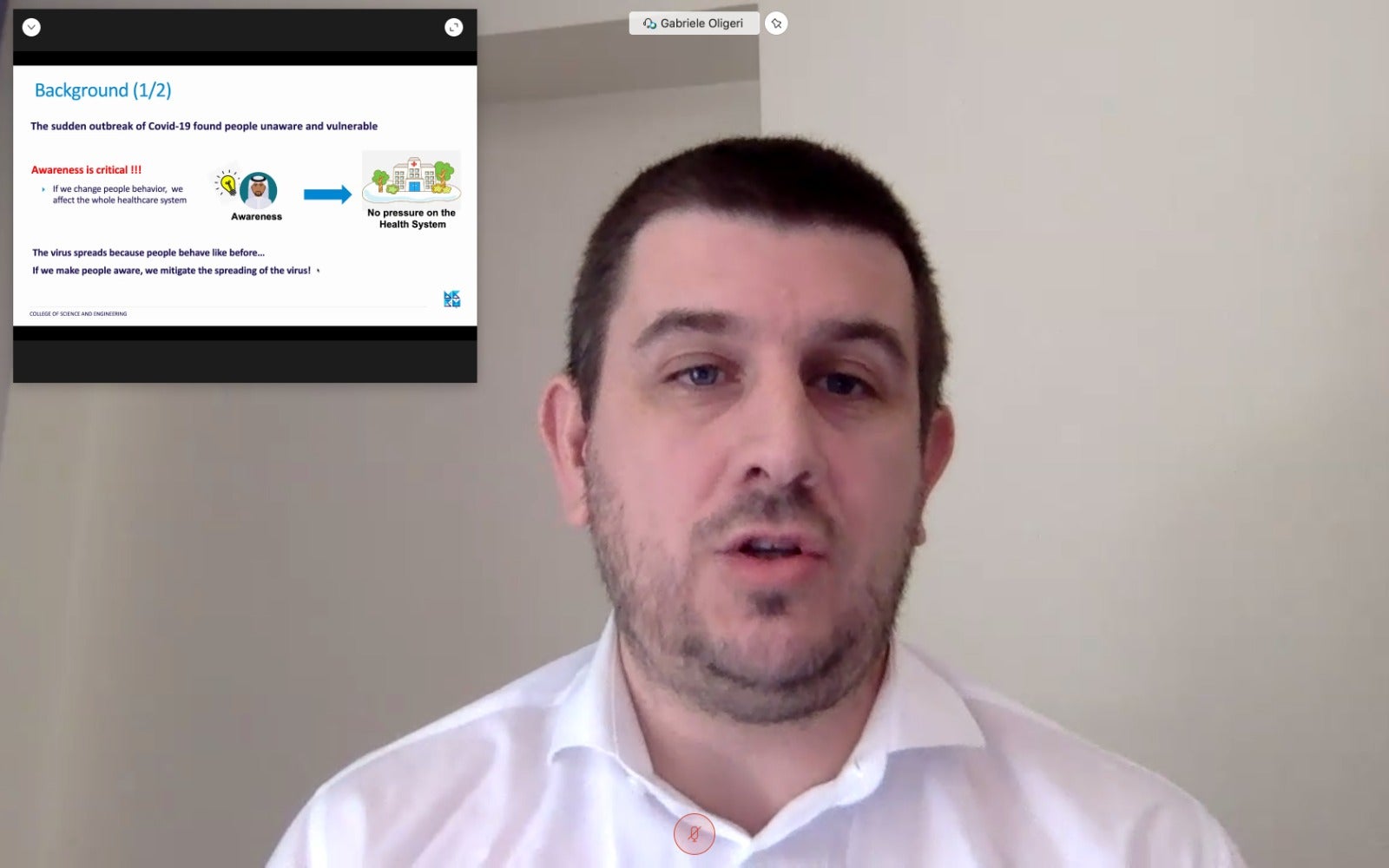
HBKU’s College of Science and Engineering Collaborates with MoTC to Deliver Webinar Series

Dr. Saif Al-Kuwari Assistant Professor, College of Science and Engineering, Hamad Bin Khalifa University

Not All Hackers Are Criminals, and Some of the Good Guys Can Earn a Million Dollars

College of Science and Engineering Faculty Member Participates in Kuwait Digital Health Conference
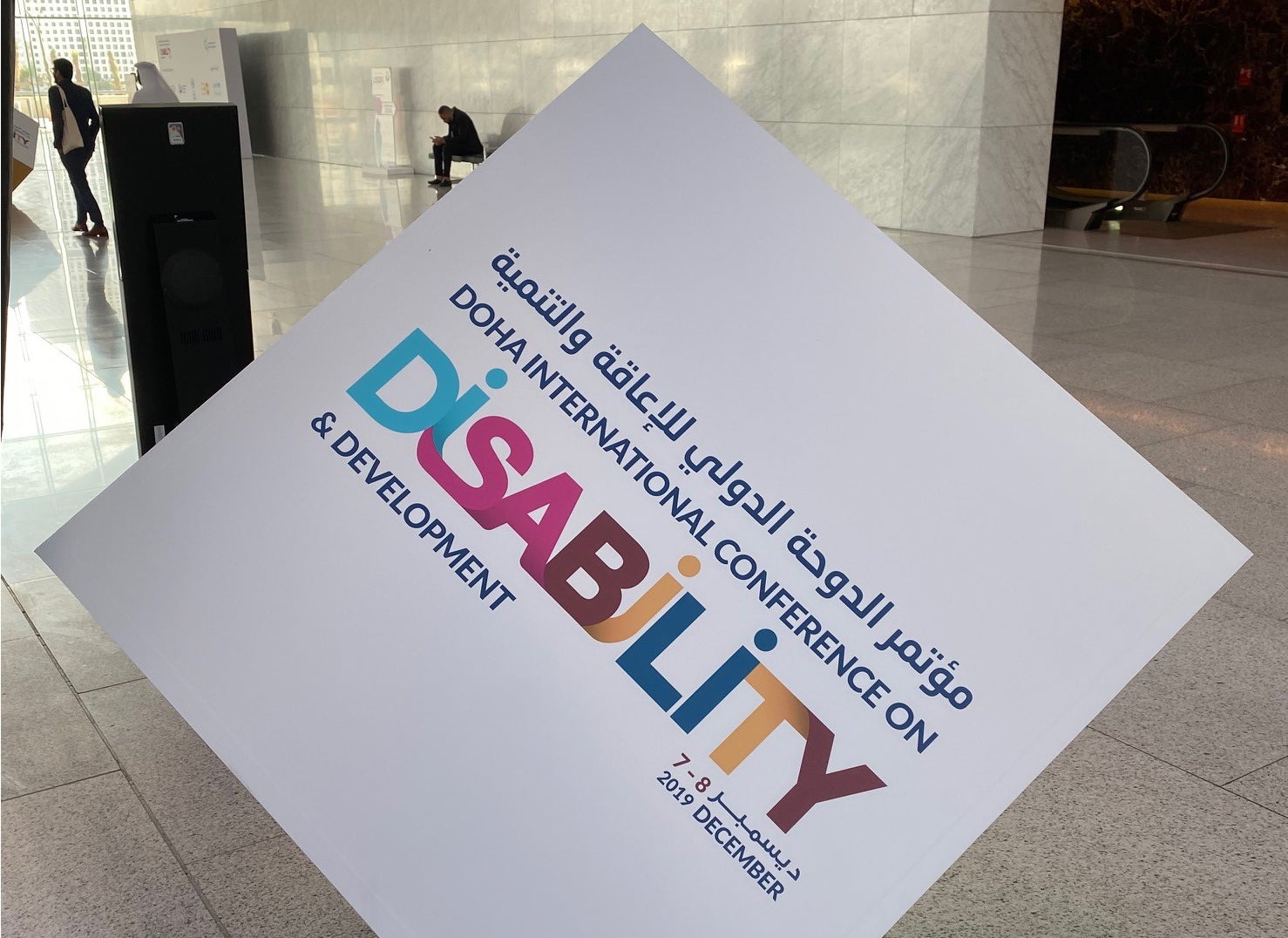
College of Science and Engineering Faculty Contributes to Disability and Development Conference
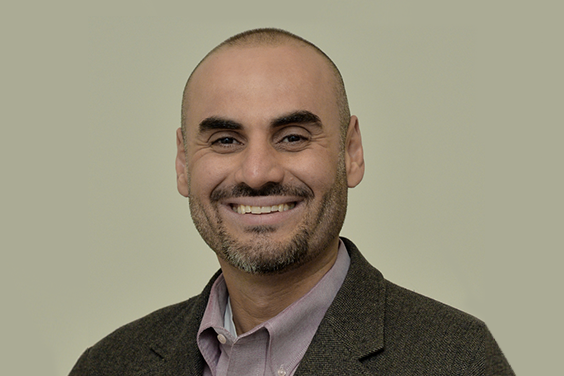
The Challenges of Data Analytics in Healthcare: Transpired Promises or an Uncertain Future?
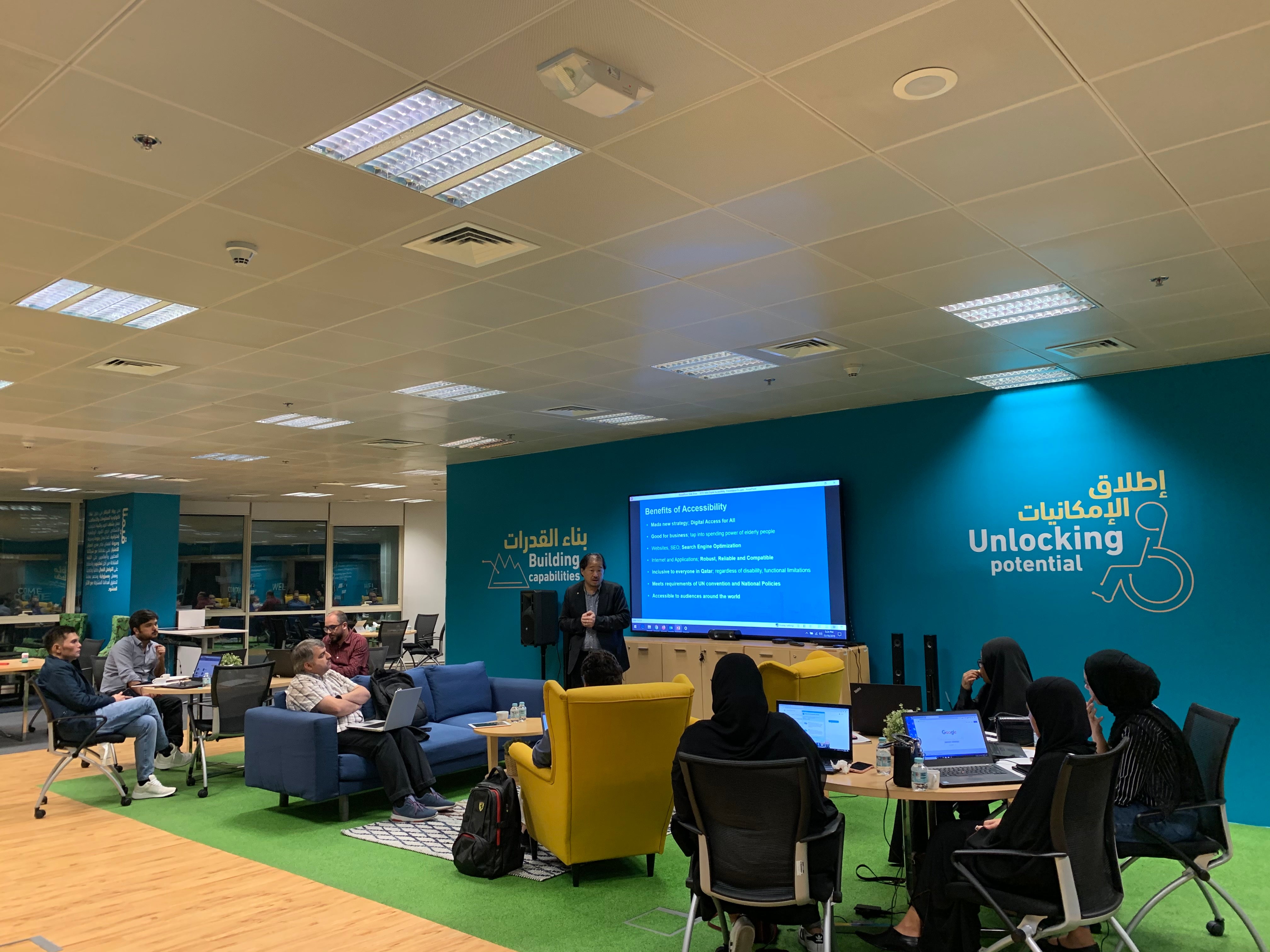
College of Science and Engineering Students Attend Digital Accessibility Workshop at Mada

PhD Student at HBKU’s College of Science and Engineering Awarded at Kuwait Invention Competition

HBKU’s College of Science and Engineering Graduate Advances Education Data as a UN Fellow

College of Science and Engineering Teams Up With Siemens Qatar to Deliver Digital Skills Training for Students

College of Science and Engineering Faculty Chart a Course for Ethical Software Engineering at International Workshop

HBKU’s College of Science and Engineering Collaborates with MoTC to Deliver Webinar Series

Dr. Saif Al-Kuwari Assistant Professor, College of Science and Engineering, Hamad Bin Khalifa University

Not All Hackers Are Criminals, and Some of the Good Guys Can Earn a Million Dollars

College of Science and Engineering Faculty Member Participates in Kuwait Digital Health Conference

College of Science and Engineering Faculty Contributes to Disability and Development Conference

The Challenges of Data Analytics in Healthcare: Transpired Promises or an Uncertain Future?

College of Science and Engineering Students Attend Digital Accessibility Workshop at Mada

PhD Student at HBKU’s College of Science and Engineering Awarded at Kuwait Invention Competition

HBKU’s College of Science and Engineering Graduate Advances Education Data as a UN Fellow

College of Science and Engineering Teams Up With Siemens Qatar to Deliver Digital Skills Training for Students

College of Science and Engineering Faculty Chart a Course for Ethical Software Engineering at International Workshop

HBKU’s College of Science and Engineering Collaborates with MoTC to Deliver Webinar Series

Dr. Saif Al-Kuwari Assistant Professor, College of Science and Engineering, Hamad Bin Khalifa University

Not All Hackers Are Criminals, and Some of the Good Guys Can Earn a Million Dollars

College of Science and Engineering Faculty Member Participates in Kuwait Digital Health Conference

College of Science and Engineering Faculty Contributes to Disability and Development Conference

The Challenges of Data Analytics in Healthcare: Transpired Promises or an Uncertain Future?

College of Science and Engineering Students Attend Digital Accessibility Workshop at Mada

PhD Student at HBKU’s College of Science and Engineering Awarded at Kuwait Invention Competition

HBKU’s College of Science and Engineering Graduate Advances Education Data as a UN Fellow

College of Science and Engineering Teams Up With Siemens Qatar to Deliver Digital Skills Training for Students

College of Science and Engineering Faculty Chart a Course for Ethical Software Engineering at International Workshop

HBKU’s College of Science and Engineering Collaborates with MoTC to Deliver Webinar Series

Dr. Saif Al-Kuwari Assistant Professor, College of Science and Engineering, Hamad Bin Khalifa University

Not All Hackers Are Criminals, and Some of the Good Guys Can Earn a Million Dollars

College of Science and Engineering Faculty Member Participates in Kuwait Digital Health Conference

College of Science and Engineering Faculty Contributes to Disability and Development Conference

The Challenges of Data Analytics in Healthcare: Transpired Promises or an Uncertain Future?

College of Science and Engineering Students Attend Digital Accessibility Workshop at Mada

PhD Student at HBKU’s College of Science and Engineering Awarded at Kuwait Invention Competition

HBKU’s College of Science and Engineering Graduate Advances Education Data as a UN Fellow

College of Science and Engineering Teams Up With Siemens Qatar to Deliver Digital Skills Training for Students

College of Science and Engineering Faculty Chart a Course for Ethical Software Engineering at International Workshop

HBKU’s College of Science and Engineering Collaborates with MoTC to Deliver Webinar Series

Dr. Saif Al-Kuwari Assistant Professor, College of Science and Engineering, Hamad Bin Khalifa University

Not All Hackers Are Criminals, and Some of the Good Guys Can Earn a Million Dollars

College of Science and Engineering Faculty Member Participates in Kuwait Digital Health Conference

College of Science and Engineering Faculty Contributes to Disability and Development Conference

The Challenges of Data Analytics in Healthcare: Transpired Promises or an Uncertain Future?

College of Science and Engineering Students Attend Digital Accessibility Workshop at Mada

PhD Student at HBKU’s College of Science and Engineering Awarded at Kuwait Invention Competition

HBKU’s College of Science and Engineering Graduate Advances Education Data as a UN Fellow

College of Science and Engineering Teams Up With Siemens Qatar to Deliver Digital Skills Training for Students

College of Science and Engineering Faculty Chart a Course for Ethical Software Engineering at International Workshop

HBKU’s College of Science and Engineering Collaborates with MoTC to Deliver Webinar Series

Dr. Saif Al-Kuwari Assistant Professor, College of Science and Engineering, Hamad Bin Khalifa University

Not All Hackers Are Criminals, and Some of the Good Guys Can Earn a Million Dollars

College of Science and Engineering Faculty Member Participates in Kuwait Digital Health Conference

College of Science and Engineering Faculty Contributes to Disability and Development Conference

The Challenges of Data Analytics in Healthcare: Transpired Promises or an Uncertain Future?

College of Science and Engineering Students Attend Digital Accessibility Workshop at Mada

PhD Student at HBKU’s College of Science and Engineering Awarded at Kuwait Invention Competition

HBKU’s College of Science and Engineering Graduate Advances Education Data as a UN Fellow

College of Science and Engineering Teams Up With Siemens Qatar to Deliver Digital Skills Training for Students

College of Science and Engineering Faculty Chart a Course for Ethical Software Engineering at International Workshop

HBKU’s College of Science and Engineering Collaborates with MoTC to Deliver Webinar Series

Dr. Saif Al-Kuwari Assistant Professor, College of Science and Engineering, Hamad Bin Khalifa University

Not All Hackers Are Criminals, and Some of the Good Guys Can Earn a Million Dollars

College of Science and Engineering Faculty Member Participates in Kuwait Digital Health Conference

College of Science and Engineering Faculty Contributes to Disability and Development Conference

The Challenges of Data Analytics in Healthcare: Transpired Promises or an Uncertain Future?

College of Science and Engineering Students Attend Digital Accessibility Workshop at Mada

PhD Student at HBKU’s College of Science and Engineering Awarded at Kuwait Invention Competition

HBKU’s College of Science and Engineering Graduate Advances Education Data as a UN Fellow

College of Science and Engineering Teams Up With Siemens Qatar to Deliver Digital Skills Training for Students

College of Science and Engineering Faculty Chart a Course for Ethical Software Engineering at International Workshop

HBKU’s College of Science and Engineering Collaborates with MoTC to Deliver Webinar Series

Dr. Saif Al-Kuwari Assistant Professor, College of Science and Engineering, Hamad Bin Khalifa University

Not All Hackers Are Criminals, and Some of the Good Guys Can Earn a Million Dollars

College of Science and Engineering Faculty Member Participates in Kuwait Digital Health Conference

College of Science and Engineering Faculty Contributes to Disability and Development Conference

The Challenges of Data Analytics in Healthcare: Transpired Promises or an Uncertain Future?

College of Science and Engineering Students Attend Digital Accessibility Workshop at Mada

PhD Student at HBKU’s College of Science and Engineering Awarded at Kuwait Invention Competition

HBKU’s College of Science and Engineering Graduate Advances Education Data as a UN Fellow

College of Science and Engineering Teams Up With Siemens Qatar to Deliver Digital Skills Training for Students

College of Science and Engineering Faculty Chart a Course for Ethical Software Engineering at International Workshop

HBKU’s College of Science and Engineering Collaborates with MoTC to Deliver Webinar Series

Dr. Saif Al-Kuwari Assistant Professor, College of Science and Engineering, Hamad Bin Khalifa University

Not All Hackers Are Criminals, and Some of the Good Guys Can Earn a Million Dollars

College of Science and Engineering Faculty Member Participates in Kuwait Digital Health Conference

College of Science and Engineering Faculty Contributes to Disability and Development Conference

The Challenges of Data Analytics in Healthcare: Transpired Promises or an Uncertain Future?

College of Science and Engineering Students Attend Digital Accessibility Workshop at Mada

PhD Student at HBKU’s College of Science and Engineering Awarded at Kuwait Invention Competition

HBKU’s College of Science and Engineering Graduate Advances Education Data as a UN Fellow

College of Science and Engineering Teams Up With Siemens Qatar to Deliver Digital Skills Training for Students

College of Science and Engineering Faculty Chart a Course for Ethical Software Engineering at International Workshop

HBKU’s College of Science and Engineering Collaborates with MoTC to Deliver Webinar Series

Dr. Saif Al-Kuwari Assistant Professor, College of Science and Engineering, Hamad Bin Khalifa University

Not All Hackers Are Criminals, and Some of the Good Guys Can Earn a Million Dollars

College of Science and Engineering Faculty Member Participates in Kuwait Digital Health Conference

College of Science and Engineering Faculty Contributes to Disability and Development Conference

The Challenges of Data Analytics in Healthcare: Transpired Promises or an Uncertain Future?

College of Science and Engineering Students Attend Digital Accessibility Workshop at Mada

PhD Student at HBKU’s College of Science and Engineering Awarded at Kuwait Invention Competition

HBKU’s College of Science and Engineering Graduate Advances Education Data as a UN Fellow

College of Science and Engineering Teams Up With Siemens Qatar to Deliver Digital Skills Training for Students

College of Science and Engineering Faculty Chart a Course for Ethical Software Engineering at International Workshop

HBKU’s College of Science and Engineering Collaborates with MoTC to Deliver Webinar Series

Dr. Saif Al-Kuwari Assistant Professor, College of Science and Engineering, Hamad Bin Khalifa University

Not All Hackers Are Criminals, and Some of the Good Guys Can Earn a Million Dollars

College of Science and Engineering Faculty Member Participates in Kuwait Digital Health Conference

College of Science and Engineering Faculty Contributes to Disability and Development Conference

The Challenges of Data Analytics in Healthcare: Transpired Promises or an Uncertain Future?

College of Science and Engineering Students Attend Digital Accessibility Workshop at Mada

PhD Student at HBKU’s College of Science and Engineering Awarded at Kuwait Invention Competition

HBKU’s College of Science and Engineering Graduate Advances Education Data as a UN Fellow

College of Science and Engineering Teams Up With Siemens Qatar to Deliver Digital Skills Training for Students

College of Science and Engineering Faculty Chart a Course for Ethical Software Engineering at International Workshop

HBKU’s College of Science and Engineering Collaborates with MoTC to Deliver Webinar Series

Dr. Saif Al-Kuwari Assistant Professor, College of Science and Engineering, Hamad Bin Khalifa University

Not All Hackers Are Criminals, and Some of the Good Guys Can Earn a Million Dollars

College of Science and Engineering Faculty Member Participates in Kuwait Digital Health Conference

College of Science and Engineering Faculty Contributes to Disability and Development Conference

The Challenges of Data Analytics in Healthcare: Transpired Promises or an Uncertain Future?

College of Science and Engineering Students Attend Digital Accessibility Workshop at Mada

PhD Student at HBKU’s College of Science and Engineering Awarded at Kuwait Invention Competition

HBKU’s College of Science and Engineering Graduate Advances Education Data as a UN Fellow

College of Science and Engineering Teams Up With Siemens Qatar to Deliver Digital Skills Training for Students

College of Science and Engineering Faculty Chart a Course for Ethical Software Engineering at International Workshop

HBKU’s College of Science and Engineering Collaborates with MoTC to Deliver Webinar Series

Dr. Saif Al-Kuwari Assistant Professor, College of Science and Engineering, Hamad Bin Khalifa University

Not All Hackers Are Criminals, and Some of the Good Guys Can Earn a Million Dollars

College of Science and Engineering Faculty Member Participates in Kuwait Digital Health Conference

College of Science and Engineering Faculty Contributes to Disability and Development Conference

The Challenges of Data Analytics in Healthcare: Transpired Promises or an Uncertain Future?

College of Science and Engineering Students Attend Digital Accessibility Workshop at Mada

PhD Student at HBKU’s College of Science and Engineering Awarded at Kuwait Invention Competition

HBKU’s College of Science and Engineering Graduate Advances Education Data as a UN Fellow

College of Science and Engineering Teams Up With Siemens Qatar to Deliver Digital Skills Training for Students

College of Science and Engineering Faculty Chart a Course for Ethical Software Engineering at International Workshop

HBKU’s College of Science and Engineering Collaborates with MoTC to Deliver Webinar Series

Dr. Saif Al-Kuwari Assistant Professor, College of Science and Engineering, Hamad Bin Khalifa University

Not All Hackers Are Criminals, and Some of the Good Guys Can Earn a Million Dollars

College of Science and Engineering Faculty Member Participates in Kuwait Digital Health Conference

College of Science and Engineering Faculty Contributes to Disability and Development Conference

The Challenges of Data Analytics in Healthcare: Transpired Promises or an Uncertain Future?

College of Science and Engineering Students Attend Digital Accessibility Workshop at Mada

PhD Student at HBKU’s College of Science and Engineering Awarded at Kuwait Invention Competition

HBKU’s College of Science and Engineering Graduate Advances Education Data as a UN Fellow

College of Science and Engineering Teams Up With Siemens Qatar to Deliver Digital Skills Training for Students

College of Science and Engineering Faculty Chart a Course for Ethical Software Engineering at International Workshop

HBKU’s College of Science and Engineering Collaborates with MoTC to Deliver Webinar Series

Dr. Saif Al-Kuwari Assistant Professor, College of Science and Engineering, Hamad Bin Khalifa University

Not All Hackers Are Criminals, and Some of the Good Guys Can Earn a Million Dollars

College of Science and Engineering Faculty Member Participates in Kuwait Digital Health Conference

College of Science and Engineering Faculty Contributes to Disability and Development Conference

The Challenges of Data Analytics in Healthcare: Transpired Promises or an Uncertain Future?

College of Science and Engineering Students Attend Digital Accessibility Workshop at Mada

PhD Student at HBKU’s College of Science and Engineering Awarded at Kuwait Invention Competition

HBKU’s College of Science and Engineering Graduate Advances Education Data as a UN Fellow

College of Science and Engineering Teams Up With Siemens Qatar to Deliver Digital Skills Training for Students

College of Science and Engineering Faculty Chart a Course for Ethical Software Engineering at International Workshop

HBKU’s College of Science and Engineering Collaborates with MoTC to Deliver Webinar Series

Dr. Saif Al-Kuwari Assistant Professor, College of Science and Engineering, Hamad Bin Khalifa University

Not All Hackers Are Criminals, and Some of the Good Guys Can Earn a Million Dollars

College of Science and Engineering Faculty Member Participates in Kuwait Digital Health Conference

College of Science and Engineering Faculty Contributes to Disability and Development Conference

The Challenges of Data Analytics in Healthcare: Transpired Promises or an Uncertain Future?

College of Science and Engineering Students Attend Digital Accessibility Workshop at Mada

PhD Student at HBKU’s College of Science and Engineering Awarded at Kuwait Invention Competition

HBKU’s College of Science and Engineering Graduate Advances Education Data as a UN Fellow

College of Science and Engineering Teams Up With Siemens Qatar to Deliver Digital Skills Training for Students

College of Science and Engineering Faculty Chart a Course for Ethical Software Engineering at International Workshop

HBKU’s College of Science and Engineering Collaborates with MoTC to Deliver Webinar Series

Dr. Saif Al-Kuwari Assistant Professor, College of Science and Engineering, Hamad Bin Khalifa University

Not All Hackers Are Criminals, and Some of the Good Guys Can Earn a Million Dollars

College of Science and Engineering Faculty Member Participates in Kuwait Digital Health Conference

College of Science and Engineering Faculty Contributes to Disability and Development Conference

The Challenges of Data Analytics in Healthcare: Transpired Promises or an Uncertain Future?

College of Science and Engineering Students Attend Digital Accessibility Workshop at Mada

PhD Student at HBKU’s College of Science and Engineering Awarded at Kuwait Invention Competition

HBKU’s College of Science and Engineering Graduate Advances Education Data as a UN Fellow

College of Science and Engineering Teams Up With Siemens Qatar to Deliver Digital Skills Training for Students

College of Science and Engineering Faculty Chart a Course for Ethical Software Engineering at International Workshop

HBKU’s College of Science and Engineering Collaborates with MoTC to Deliver Webinar Series

Dr. Saif Al-Kuwari Assistant Professor, College of Science and Engineering, Hamad Bin Khalifa University

Not All Hackers Are Criminals, and Some of the Good Guys Can Earn a Million Dollars

College of Science and Engineering Faculty Member Participates in Kuwait Digital Health Conference

College of Science and Engineering Faculty Contributes to Disability and Development Conference

The Challenges of Data Analytics in Healthcare: Transpired Promises or an Uncertain Future?

College of Science and Engineering Students Attend Digital Accessibility Workshop at Mada

PhD Student at HBKU’s College of Science and Engineering Awarded at Kuwait Invention Competition

HBKU’s College of Science and Engineering Graduate Advances Education Data as a UN Fellow

College of Science and Engineering Teams Up With Siemens Qatar to Deliver Digital Skills Training for Students

College of Science and Engineering Faculty Chart a Course for Ethical Software Engineering at International Workshop

HBKU’s College of Science and Engineering Collaborates with MoTC to Deliver Webinar Series

Dr. Saif Al-Kuwari Assistant Professor, College of Science and Engineering, Hamad Bin Khalifa University

Not All Hackers Are Criminals, and Some of the Good Guys Can Earn a Million Dollars

College of Science and Engineering Faculty Member Participates in Kuwait Digital Health Conference

College of Science and Engineering Faculty Contributes to Disability and Development Conference

The Challenges of Data Analytics in Healthcare: Transpired Promises or an Uncertain Future?

College of Science and Engineering Students Attend Digital Accessibility Workshop at Mada

PhD Student at HBKU’s College of Science and Engineering Awarded at Kuwait Invention Competition

HBKU’s College of Science and Engineering Graduate Advances Education Data as a UN Fellow

College of Science and Engineering Teams Up With Siemens Qatar to Deliver Digital Skills Training for Students

College of Science and Engineering Faculty Chart a Course for Ethical Software Engineering at International Workshop

HBKU’s College of Science and Engineering Collaborates with MoTC to Deliver Webinar Series

Dr. Saif Al-Kuwari Assistant Professor, College of Science and Engineering, Hamad Bin Khalifa University

Not All Hackers Are Criminals, and Some of the Good Guys Can Earn a Million Dollars

College of Science and Engineering Faculty Member Participates in Kuwait Digital Health Conference

College of Science and Engineering Faculty Contributes to Disability and Development Conference

The Challenges of Data Analytics in Healthcare: Transpired Promises or an Uncertain Future?

College of Science and Engineering Students Attend Digital Accessibility Workshop at Mada

PhD Student at HBKU’s College of Science and Engineering Awarded at Kuwait Invention Competition

HBKU’s College of Science and Engineering Graduate Advances Education Data as a UN Fellow

College of Science and Engineering Teams Up With Siemens Qatar to Deliver Digital Skills Training for Students

College of Science and Engineering Faculty Chart a Course for Ethical Software Engineering at International Workshop

HBKU’s College of Science and Engineering Collaborates with MoTC to Deliver Webinar Series

Dr. Saif Al-Kuwari Assistant Professor, College of Science and Engineering, Hamad Bin Khalifa University

Not All Hackers Are Criminals, and Some of the Good Guys Can Earn a Million Dollars

College of Science and Engineering Faculty Member Participates in Kuwait Digital Health Conference

College of Science and Engineering Faculty Contributes to Disability and Development Conference

The Challenges of Data Analytics in Healthcare: Transpired Promises or an Uncertain Future?

College of Science and Engineering Students Attend Digital Accessibility Workshop at Mada

PhD Student at HBKU’s College of Science and Engineering Awarded at Kuwait Invention Competition

HBKU’s College of Science and Engineering Graduate Advances Education Data as a UN Fellow

College of Science and Engineering Teams Up With Siemens Qatar to Deliver Digital Skills Training for Students

College of Science and Engineering Faculty Chart a Course for Ethical Software Engineering at International Workshop

HBKU’s College of Science and Engineering Collaborates with MoTC to Deliver Webinar Series

Dr. Saif Al-Kuwari Assistant Professor, College of Science and Engineering, Hamad Bin Khalifa University

Not All Hackers Are Criminals, and Some of the Good Guys Can Earn a Million Dollars

College of Science and Engineering Faculty Member Participates in Kuwait Digital Health Conference

College of Science and Engineering Faculty Contributes to Disability and Development Conference

The Challenges of Data Analytics in Healthcare: Transpired Promises or an Uncertain Future?

College of Science and Engineering Students Attend Digital Accessibility Workshop at Mada

PhD Student at HBKU’s College of Science and Engineering Awarded at Kuwait Invention Competition

HBKU’s College of Science and Engineering Graduate Advances Education Data as a UN Fellow

College of Science and Engineering Teams Up With Siemens Qatar to Deliver Digital Skills Training for Students

College of Science and Engineering Faculty Chart a Course for Ethical Software Engineering at International Workshop

HBKU’s College of Science and Engineering Collaborates with MoTC to Deliver Webinar Series

Dr. Saif Al-Kuwari Assistant Professor, College of Science and Engineering, Hamad Bin Khalifa University

Not All Hackers Are Criminals, and Some of the Good Guys Can Earn a Million Dollars

College of Science and Engineering Faculty Member Participates in Kuwait Digital Health Conference

College of Science and Engineering Faculty Contributes to Disability and Development Conference

The Challenges of Data Analytics in Healthcare: Transpired Promises or an Uncertain Future?

College of Science and Engineering Students Attend Digital Accessibility Workshop at Mada

PhD Student at HBKU’s College of Science and Engineering Awarded at Kuwait Invention Competition

HBKU’s College of Science and Engineering Graduate Advances Education Data as a UN Fellow

College of Science and Engineering Teams Up With Siemens Qatar to Deliver Digital Skills Training for Students

College of Science and Engineering Faculty Chart a Course for Ethical Software Engineering at International Workshop

HBKU’s College of Science and Engineering Collaborates with MoTC to Deliver Webinar Series

Dr. Saif Al-Kuwari Assistant Professor, College of Science and Engineering, Hamad Bin Khalifa University

Not All Hackers Are Criminals, and Some of the Good Guys Can Earn a Million Dollars

College of Science and Engineering Faculty Member Participates in Kuwait Digital Health Conference

College of Science and Engineering Faculty Contributes to Disability and Development Conference

The Challenges of Data Analytics in Healthcare: Transpired Promises or an Uncertain Future?

College of Science and Engineering Students Attend Digital Accessibility Workshop at Mada

PhD Student at HBKU’s College of Science and Engineering Awarded at Kuwait Invention Competition

HBKU’s College of Science and Engineering Graduate Advances Education Data as a UN Fellow

College of Science and Engineering Teams Up With Siemens Qatar to Deliver Digital Skills Training for Students

College of Science and Engineering Faculty Chart a Course for Ethical Software Engineering at International Workshop

HBKU’s College of Science and Engineering Collaborates with MoTC to Deliver Webinar Series

Dr. Saif Al-Kuwari Assistant Professor, College of Science and Engineering, Hamad Bin Khalifa University

Not All Hackers Are Criminals, and Some of the Good Guys Can Earn a Million Dollars

College of Science and Engineering Faculty Member Participates in Kuwait Digital Health Conference

College of Science and Engineering Faculty Contributes to Disability and Development Conference

The Challenges of Data Analytics in Healthcare: Transpired Promises or an Uncertain Future?

College of Science and Engineering Students Attend Digital Accessibility Workshop at Mada

PhD Student at HBKU’s College of Science and Engineering Awarded at Kuwait Invention Competition

HBKU’s College of Science and Engineering Graduate Advances Education Data as a UN Fellow

College of Science and Engineering Teams Up With Siemens Qatar to Deliver Digital Skills Training for Students

College of Science and Engineering Faculty Chart a Course for Ethical Software Engineering at International Workshop

HBKU’s College of Science and Engineering Collaborates with MoTC to Deliver Webinar Series

Dr. Saif Al-Kuwari Assistant Professor, College of Science and Engineering, Hamad Bin Khalifa University

Not All Hackers Are Criminals, and Some of the Good Guys Can Earn a Million Dollars

College of Science and Engineering Faculty Member Participates in Kuwait Digital Health Conference

College of Science and Engineering Faculty Contributes to Disability and Development Conference

The Challenges of Data Analytics in Healthcare: Transpired Promises or an Uncertain Future?

College of Science and Engineering Students Attend Digital Accessibility Workshop at Mada

PhD Student at HBKU’s College of Science and Engineering Awarded at Kuwait Invention Competition

HBKU’s College of Science and Engineering Graduate Advances Education Data as a UN Fellow

College of Science and Engineering Teams Up With Siemens Qatar to Deliver Digital Skills Training for Students

College of Science and Engineering Faculty Chart a Course for Ethical Software Engineering at International Workshop

HBKU’s College of Science and Engineering Collaborates with MoTC to Deliver Webinar Series

Dr. Saif Al-Kuwari Assistant Professor, College of Science and Engineering, Hamad Bin Khalifa University

Not All Hackers Are Criminals, and Some of the Good Guys Can Earn a Million Dollars

College of Science and Engineering Faculty Member Participates in Kuwait Digital Health Conference

College of Science and Engineering Faculty Contributes to Disability and Development Conference

The Challenges of Data Analytics in Healthcare: Transpired Promises or an Uncertain Future?

College of Science and Engineering Students Attend Digital Accessibility Workshop at Mada

PhD Student at HBKU’s College of Science and Engineering Awarded at Kuwait Invention Competition

HBKU’s College of Science and Engineering Graduate Advances Education Data as a UN Fellow

College of Science and Engineering Teams Up With Siemens Qatar to Deliver Digital Skills Training for Students

College of Science and Engineering Faculty Chart a Course for Ethical Software Engineering at International Workshop

HBKU’s College of Science and Engineering Collaborates with MoTC to Deliver Webinar Series

Dr. Saif Al-Kuwari Assistant Professor, College of Science and Engineering, Hamad Bin Khalifa University

Not All Hackers Are Criminals, and Some of the Good Guys Can Earn a Million Dollars

College of Science and Engineering Faculty Member Participates in Kuwait Digital Health Conference

College of Science and Engineering Faculty Contributes to Disability and Development Conference

The Challenges of Data Analytics in Healthcare: Transpired Promises or an Uncertain Future?

College of Science and Engineering Students Attend Digital Accessibility Workshop at Mada

PhD Student at HBKU’s College of Science and Engineering Awarded at Kuwait Invention Competition

HBKU’s College of Science and Engineering Graduate Advances Education Data as a UN Fellow

College of Science and Engineering Teams Up With Siemens Qatar to Deliver Digital Skills Training for Students

College of Science and Engineering Faculty Chart a Course for Ethical Software Engineering at International Workshop

HBKU’s College of Science and Engineering Collaborates with MoTC to Deliver Webinar Series

Dr. Saif Al-Kuwari Assistant Professor, College of Science and Engineering, Hamad Bin Khalifa University

Not All Hackers Are Criminals, and Some of the Good Guys Can Earn a Million Dollars

College of Science and Engineering Faculty Member Participates in Kuwait Digital Health Conference

College of Science and Engineering Faculty Contributes to Disability and Development Conference

The Challenges of Data Analytics in Healthcare: Transpired Promises or an Uncertain Future?

College of Science and Engineering Students Attend Digital Accessibility Workshop at Mada

PhD Student at HBKU’s College of Science and Engineering Awarded at Kuwait Invention Competition

HBKU’s College of Science and Engineering Graduate Advances Education Data as a UN Fellow

College of Science and Engineering Teams Up With Siemens Qatar to Deliver Digital Skills Training for Students

College of Science and Engineering Faculty Chart a Course for Ethical Software Engineering at International Workshop

HBKU’s College of Science and Engineering Collaborates with MoTC to Deliver Webinar Series

Dr. Saif Al-Kuwari Assistant Professor, College of Science and Engineering, Hamad Bin Khalifa University

Not All Hackers Are Criminals, and Some of the Good Guys Can Earn a Million Dollars

College of Science and Engineering Faculty Member Participates in Kuwait Digital Health Conference

College of Science and Engineering Faculty Contributes to Disability and Development Conference

The Challenges of Data Analytics in Healthcare: Transpired Promises or an Uncertain Future?

College of Science and Engineering Students Attend Digital Accessibility Workshop at Mada

PhD Student at HBKU’s College of Science and Engineering Awarded at Kuwait Invention Competition

HBKU’s College of Science and Engineering Graduate Advances Education Data as a UN Fellow

College of Science and Engineering Teams Up With Siemens Qatar to Deliver Digital Skills Training for Students

College of Science and Engineering Faculty Chart a Course for Ethical Software Engineering at International Workshop

HBKU’s College of Science and Engineering Collaborates with MoTC to Deliver Webinar Series

Dr. Saif Al-Kuwari Assistant Professor, College of Science and Engineering, Hamad Bin Khalifa University

Not All Hackers Are Criminals, and Some of the Good Guys Can Earn a Million Dollars

College of Science and Engineering Faculty Member Participates in Kuwait Digital Health Conference

College of Science and Engineering Faculty Contributes to Disability and Development Conference

The Challenges of Data Analytics in Healthcare: Transpired Promises or an Uncertain Future?

College of Science and Engineering Students Attend Digital Accessibility Workshop at Mada

PhD Student at HBKU’s College of Science and Engineering Awarded at Kuwait Invention Competition

HBKU’s College of Science and Engineering Graduate Advances Education Data as a UN Fellow

College of Science and Engineering Teams Up With Siemens Qatar to Deliver Digital Skills Training for Students

College of Science and Engineering Faculty Chart a Course for Ethical Software Engineering at International Workshop

HBKU’s College of Science and Engineering Collaborates with MoTC to Deliver Webinar Series

Dr. Saif Al-Kuwari Assistant Professor, College of Science and Engineering, Hamad Bin Khalifa University

Not All Hackers Are Criminals, and Some of the Good Guys Can Earn a Million Dollars

College of Science and Engineering Faculty Member Participates in Kuwait Digital Health Conference

College of Science and Engineering Faculty Contributes to Disability and Development Conference

The Challenges of Data Analytics in Healthcare: Transpired Promises or an Uncertain Future?

College of Science and Engineering Students Attend Digital Accessibility Workshop at Mada

PhD Student at HBKU’s College of Science and Engineering Awarded at Kuwait Invention Competition

HBKU’s College of Science and Engineering Graduate Advances Education Data as a UN Fellow

College of Science and Engineering Teams Up With Siemens Qatar to Deliver Digital Skills Training for Students

College of Science and Engineering Faculty Chart a Course for Ethical Software Engineering at International Workshop

HBKU’s College of Science and Engineering Collaborates with MoTC to Deliver Webinar Series

Dr. Saif Al-Kuwari Assistant Professor, College of Science and Engineering, Hamad Bin Khalifa University

Not All Hackers Are Criminals, and Some of the Good Guys Can Earn a Million Dollars

College of Science and Engineering Faculty Member Participates in Kuwait Digital Health Conference

College of Science and Engineering Faculty Contributes to Disability and Development Conference

The Challenges of Data Analytics in Healthcare: Transpired Promises or an Uncertain Future?

College of Science and Engineering Students Attend Digital Accessibility Workshop at Mada

PhD Student at HBKU’s College of Science and Engineering Awarded at Kuwait Invention Competition

HBKU’s College of Science and Engineering Graduate Advances Education Data as a UN Fellow

College of Science and Engineering Teams Up With Siemens Qatar to Deliver Digital Skills Training for Students

College of Science and Engineering Faculty Chart a Course for Ethical Software Engineering at International Workshop

HBKU’s College of Science and Engineering Collaborates with MoTC to Deliver Webinar Series

Dr. Saif Al-Kuwari Assistant Professor, College of Science and Engineering, Hamad Bin Khalifa University

Not All Hackers Are Criminals, and Some of the Good Guys Can Earn a Million Dollars

College of Science and Engineering Faculty Member Participates in Kuwait Digital Health Conference

College of Science and Engineering Faculty Contributes to Disability and Development Conference

The Challenges of Data Analytics in Healthcare: Transpired Promises or an Uncertain Future?

College of Science and Engineering Students Attend Digital Accessibility Workshop at Mada

PhD Student at HBKU’s College of Science and Engineering Awarded at Kuwait Invention Competition







